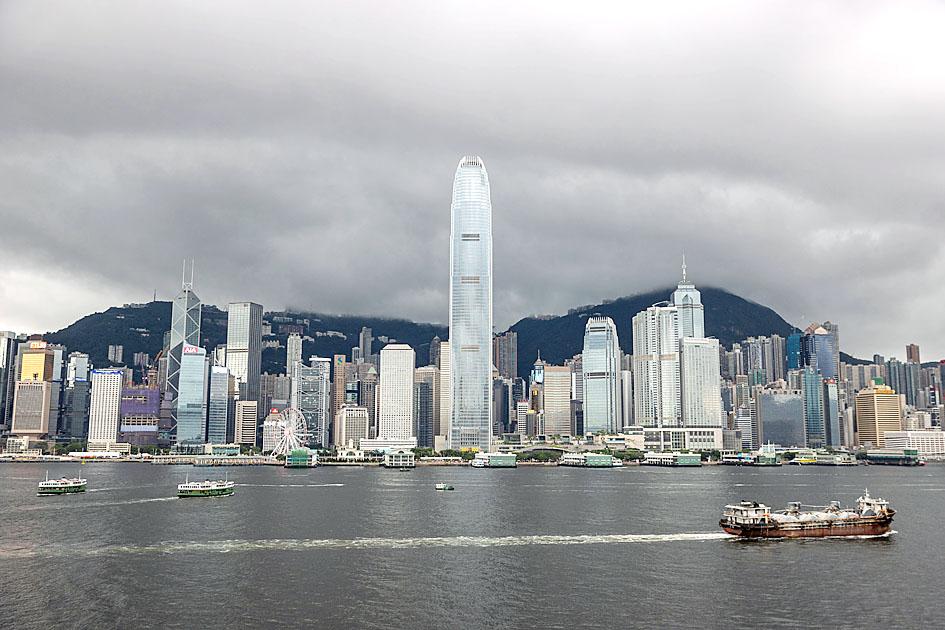Hong Kong is dusting off the gong for the territory’s first in-person listing ceremony in two years.
Logistics start-up GogoX Holdings Ltd (快狗打車) is hosting a ceremony at the exchange’s newly refurbished HKEX Connect Hall tomorrow, a media invitation said.
Attendees are required to pre-register and to declare they have taken a rapid COVID-19 antigen test the same day showing a negative result. Everyone must wear a mask.

Photo: EPA-EFE
The listing ceremony is another sign of normalcy that Hong Kong has been looking for after two years of stringent social distancing measures. The COVID-19 pandemic has reshaped dealmaking globally as meetings and due diligence go virtual because of travel restrictions.
InnoCare Pharma Ltd (諾誠健華醫藥), a Chinese biotech firm, was among the first in Hong Kong to opt for a virtual investor meeting in early 2020.
Striking a gong is a key feature of a listing ceremony in Hong Kong just like the iconic bell ringing ceremony in New York. In the Asian territory, executives usually hit the gong with mallets in red cloth, a color symbolizing good fortune and joy in Chinese culture. Since the pandemic, the gong ceremony has gone virtual.
Hong Kong’s initial public offering (IPO) market is also waiting for a big bang as inflation concerns and the war in Ukraine have slowed down activity significantly. Companies have raised about US$2.4 billion through IPOs so far this year, only a fraction of the US$26.2 billion raised during the same period last year, according to data compiled by Bloomberg.
GogoX last week held Hong Kong’s first in-person IPO press briefing in months. The start-up is also among a few companies that are set to defy the slump and test the waters.
Although it is only raising about US$86 million, the start-up has enlisted four banks as its IPO sponsors: UBS Group AG, China International Capital Corp (中國國際金融), Bocom International Holdings Co (交銀國際控股) and ABC International Holdings Ltd (農銀國際).

Taiwan’s technology protection rules prohibits Taiwan Semiconductor Manufacturing Co (TSMC, 台積電) from producing 2-nanometer chips abroad, so the company must keep its most cutting-edge technology at home, Minister of Economic Affairs J.W. Kuo (郭智輝) said yesterday. Kuo made the remarks in response to concerns that TSMC might be forced to produce advanced 2-nanometer chips at its fabs in Arizona ahead of schedule after former US president Donald Trump was re-elected as the next US president on Tuesday. “Since Taiwan has related regulations to protect its own technologies, TSMC cannot produce 2-nanometer chips overseas currently,” Kuo said at a meeting of the legislature’s

GEOPOLITICAL ISSUES? The economics ministry said that political factors should not affect supply chains linking global satellite firms and Taiwanese manufacturers Elon Musk’s Space Exploration Technologies Corp (SpaceX) asked Taiwanese suppliers to transfer manufacturing out of Taiwan, leading to some relocating portions of their supply chain, according to sources employed by and close to the equipment makers and corporate documents. A source at a company that is one of the numerous subcontractors that provide components for SpaceX’s Starlink satellite Internet products said that SpaceX asked their manufacturers to produce outside of Taiwan because of geopolitical risks, pushing at least one to move production to Vietnam. A second source who collaborates with Taiwanese satellite component makers in the nation said that suppliers were directly

Top Taiwanese officials yesterday moved to ease concern about the potential fallout of Donald Trump’s return to the White House, making a case that the technology restrictions promised by the former US president against China would outweigh the risks to the island. The prospect of Trump’s victory in this week’s election is a worry for Taipei given the Republican nominee in the past cast doubt over the US commitment to defend it from Beijing. But other policies championed by Trump toward China hold some appeal for Taiwan. National Development Council Minister Paul Liu (劉鏡清) described the proposed technology curbs as potentially having

EXPORT CONTROLS: US lawmakers have grown more concerned that the US Department of Commerce might not be aggressively enforcing its chip restrictions The US on Friday said it imposed a US$500,000 penalty on New York-based GlobalFoundries Inc, the world’s third-largest contract chipmaker, for shipping chips without authorization to an affiliate of blacklisted Chinese chipmaker Semiconductor Manufacturing International Corp (SMIC, 中芯). The US Department of Commerce in a statement said GlobalFoundries sent 74 shipments worth US$17.1 million to SJ Semiconductor Corp (盛合晶微半導體), an affiliate of SMIC, without seeking a license. Both SMIC and SJ Semiconductor were added to the department’s trade restriction Entity List in 2020 over SMIC’s alleged ties to the Chinese military-industrial complex. SMIC has denied wrongdoing. Exports to firms on the list